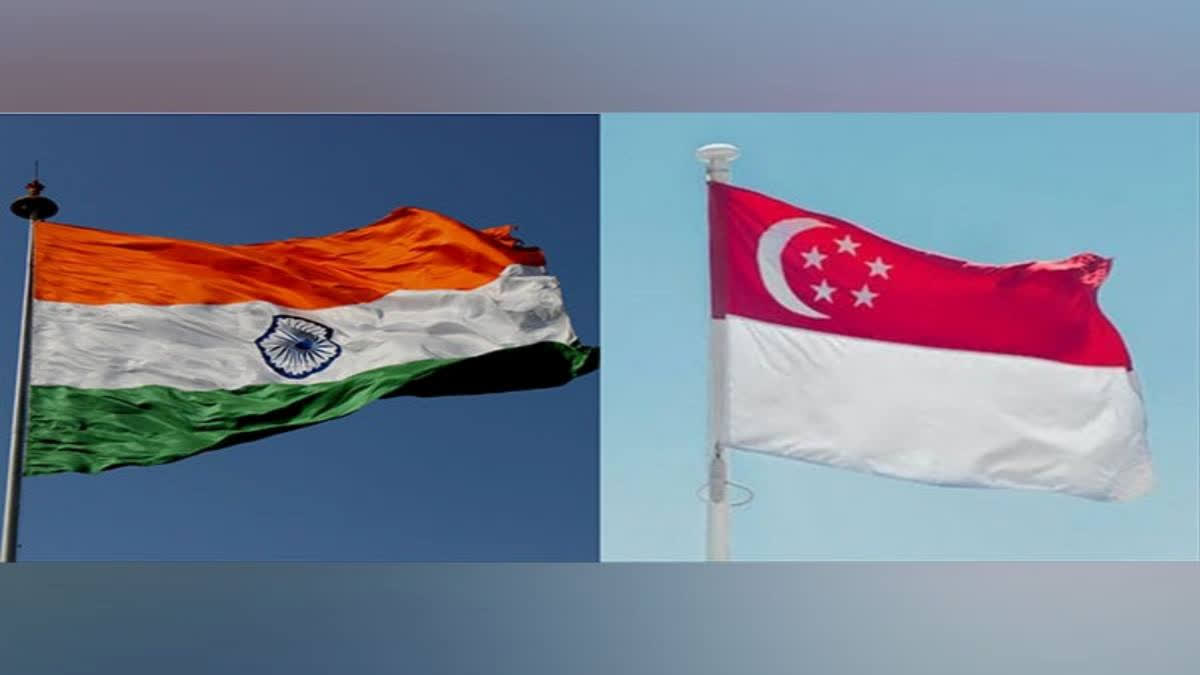New Delhi: Amid China's growing influence in the ASEAN region, Prime Minister Narendra Modi is set to visit Singapore on September 4-5 at the invitation of the newly elected Prime Minister Lawrence Wong to play a bigger role and strengthen bilateral engagement with Southeast Asia.
In response to ETV Bharat's Chandrakala Choudhury, as to how the relations between India and Singapore going further given the new regime in place and also as far as China's rising influence is concerned, Secretary EAST in the Ministry of External Affairs Jaideep Mazumdar said, "Independent of our relations with any third country, India and Singapore relations are poised for an even bigger takeoff, I think than what it has been in the last 10-15 years or so. That is because we have now gone to the next level of identifying areas of bilateral cooperation whether it be in food security, in renewables, in green hydrogen, in semiconductors, these are all areas where we have great complementarities and we can really complement each other in each of them".
"India- Singapore relationship as really taking off to the next stage and this is entirely driven by the logic of our respective situations. For Singapore, India presents tremendous opportunities and for us, Singapore presents us with many options regarding whether it be value chains, digital technologies and semiconductors," added Mazumdar.
It is pertinent to note that China's influence in ASEAN (Association of Southeast Asian Nations) has grown significantly over the past few decades. China is the largest trading partner of ASEAN. Trade between China and ASEAN has grown substantially, with the two sides forming a close economic partnership. In 2020, China and ASEAN became each other's largest trading partners for the first time.
Beijing is a major source of foreign direct investment (FDI) in ASEAN countries. Investments have been made in various sectors, including infrastructure, manufacturing and technology, often linked to the Belt and Road Initiative (BRI).
In fact, many ASEAN countries are involved in China's BRI, which aims to enhance connectivity and cooperation through infrastructure development. This has led to significant Chinese investments in ports, railways and other critical infrastructure across the region, which has become a major concern for India. The South China Sea is a major point of tension between China and several ASEAN members (e.g., Vietnam, the Philippines and Malaysia). China's assertive claims and actions in the South China Sea have led to diplomatic challenges within ASEAN where member states have diverse views on how to manage the disputes.
China and ASEAN are both part of RCEP, the world’s largest free trade agreement, which is expected to further integrate their economies. This could increase China's economic influence, although it also opens opportunities for ASEAN to engage with other partners. The evolving geopolitical landscape, including the US-China competition and India's growing role, will likely influence China's approach to ASEAN. ASEAN's centrality in the Indo-Pacific strategy adopted by various countries will also shape how China engages with the region.
Prime Minister Modi is visiting Singapore after six years and the visit is taking place at the time when a new leader in Singapore, Prime Minister Lawrence Wong, has just taken over and this is an opportune time to set the stage for the next stage of our vibrant bilateral relationship.
"Our ties have evolved and we have a dynamic strategic partnership encompassing diverse areas from our shared history and people-to-people ties, which is an important link between us. Our trade and investment flows have shown steady growth, we have robust defence cooperation and growing exchanges in culture and education and we have identified new anchors of our partnership under the India-Singapore Ministerial Round Table framework. The visit will also take place in light of our 60th anniversary of diplomatic relations, which we are celebrating in 2025 and the 10th year of our strategic partnership with Singapore," Secretary (East) said during a special media briefing here on Monday.
During the PM's visit, India and Singapore will also sign an MoU on semiconductors. "Singapore is very well plugged into the global semiconductor ecosystem. It has experience of more than 20 years in this area. This is an area that we are very keen to get into, and already we are seeing how we can cooperate with Singapore. If Singapore is already setting up facilities in India and there will be many other areas of the semiconductor itself, which will be discussed and cooperation moved forward during the visit, we expect the visit to give thrust to this particular area in our cooperation. From the point of trade and investment, the Prime Minister's visit to Singapore is significant. Singapore is India's largest trading partner in ASEAN. Singapore is India's 6th largest trade partner worldwide and the largest source of FDI during the last financial year", Secretary East Jaideep Mazumdar added. India received 11.77 billion dollars of foreign direct investment (FDI) from Singapore during the last financial year.
